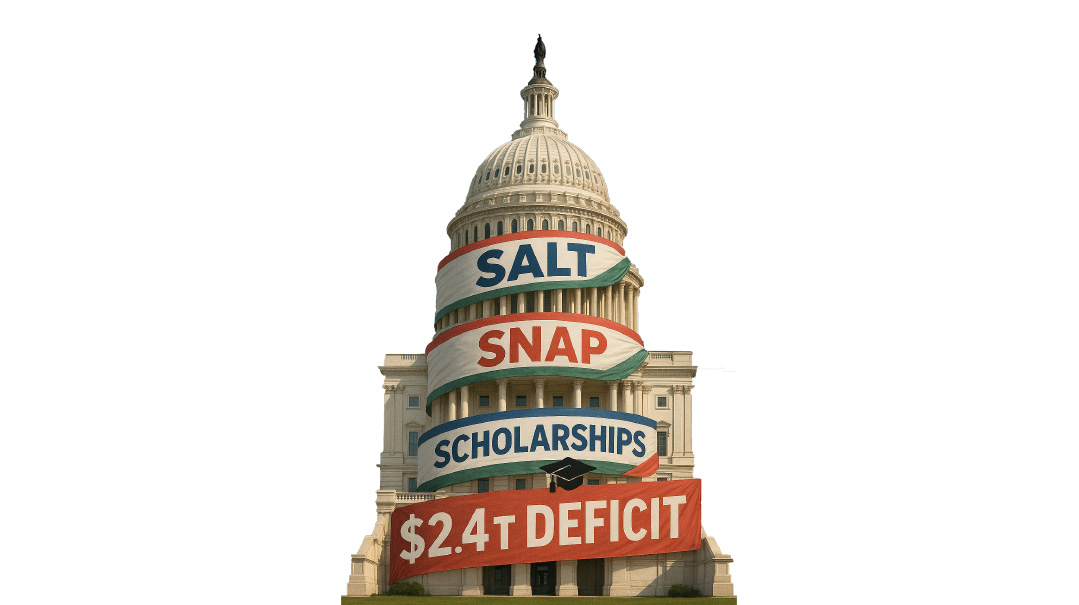And Now for Their Next Trick

If current polling holds, the 2024 elections will be a tragicomedy: a 2020 rerun

Roll up, roll up, the circus is back in town, and the show’s about to start. If current polling holds, the 2024 elections will be a tragicomedy: a 2020 rerun, with Donald Trump once again defying scandal to face off against Joe Biden, both trading the same old insults, their combined age a hoary 159 years.
Convinced that their nemesis’s name on the ballot card will get their man elected, partisans of both presidents are delighted; 65 percent of voters, not so much.
With the requisite throat-clearing about the perils of predictions in the Trump era, it’s worth considering what the race would look like. Start with what won’t be on the ballot paper: many of the serious issues that America faces.
China has emerged as a systemic competitor. It threatens to devour Taiwan, an ally and source of semiconductors critical to the US economy. It’s making diplomatic inroads across Asia, Africa and the Middle East. China’s strength is now such that America’s top diplomat Anthony Blinken visited Beijing as a quasi-supplicant this week, unsure whether President Xi would deign to grant him an audience.
Both Trump and Biden have a record on China, but don’t expect their relative efforts to receive much scrutiny.
Same with the issue of American jobs — one which Trump ran on in 2016. Those millions of jobs that fled after China joined the World Trade Organization in 2001 haven’t come back as Trump promised. Similarly, the millions of new jobs in the clean energy sector that Biden touted in his campaign have failed to materialize. But we’re unlikely to hear a peep on the subject.
Likewise for the economy, which has roller-coasted in recent years: it roared under Trump, then cratered in Covid, predictably fell prey to inflation as Biden pumped in too much stimulus, and has since stabilized. But neither man wants to talk about the fact that both parties’ economic models rest on the yet-unborn paying for their parents’ profligacy, with the federal debt currently at $32 trillion and counting.
None of those issues will be on the ballot box in a Trump-Biden redo, because for both sides, it’s a grudge match — more about the past than the future.
Trump has made it abundantly clear that he intends to relitigate the 2020 elections. After the revelations about the obscene levels of intervention staged by social media companies to shut down debate around Candidate Biden, a majority of Republican primary voters seem happy to follow Trump’s lead.
In turn, Biden is delighted to focus on those very claims and the January 6 aftermath on Capitol Hill — a surefire way of stirring up his base who believe that Trump is a mortal threat to democracy.
Pre-January 6, that personalization of politics didn’t matter as much. While in office, Trump’s name was a proxy for a raft of policies on the courts, culture wars, immigration, trade and foreign policy.
Since then, anger and conspiracy theories have dominated Trumpworld, and policy is an afterthought. In parallel, Democrats knot themselves into pretzels to avoid legitimate questions around Biden’s age and claims of corruption involving his son Hunter.
A mere decade ago, the idea that elections could be held on such terms would have been laughable; today, the joke is on the voters.
Unless the joker in the pack turns up in the form of a DeSantis surge or Biden bowing out, or a speedy Trump conviction, then in the traveling circus that is American politics, it’s almost time for the clowns’ next trick: the first certified policy-and-debate-free, 100 percent vitriolic, blindly partisan elections America has seen.
History Desk
1683 was the last time that Poland — under King Jan Sobieski — defended Europe by defeating the Ottomans at the gates of Vienna, marking the highpoint of Muslim westward expansion. Could Poland once again lead Europe militarily?
A fascinating conversation that I had recently with a senior government official in Warsaw highlighted a story that has flown under the radar for most Western media: Poland is massively rearming, and sees itself as the guarantor of Eastern Europe’s integrity even as America looks inward.
The rearmament drive has seen Warsaw send the last remnants of its outdated Soviet-era weaponry to Ukraine, upgrading to modern Western kit. But there’s a subplot: a diversification of supplies designed to make Poland less dependent on one guarantor. Alongside US weapons systems, Poland is looking to Asia as well, with a massive purchase of South Korean tanks, artillery and fighter jets.
It’s all part of a worldview that shows Warsaw in a far more confident frame of mind than has historically been the case.
“We’ve got to be able to defend ourselves against Russia,” the official said, “and we are determined to back Ukraine and make sure that the Russians are left with no gains from the war — including Crimea.”
“I have many Jewish friends since childhood, they say Zelensky is not a Jew — this is a shame for the Jewish people.”
Vladimir Putin’s latest diatribe against the Ukrainian leader, who has refused to hand his country over on a platter, echoed a long-running Russian subtext about the war referencing Nazism, anti-Semitism, and Zelensky’s Jewish identity.
It’s a reminder of a reality that our grandparents were far better acquainted with: When the times are tough — and there are no tougher times than war — somehow, it’s always about the Jews.
50%
According to unnamed officials cited by the New York Times, these are the odds of success for an American-brokered push now underway for normalization between Israel and Saudi Arabia. The very attempt is a departure for the Biden administration, which had previously put the Trump-era Abraham Accords on the backburner. But is the messaging normal expectation-management, or a sign that the effort is more for PR consumption in the diplomatic and political fields, and not a top priority for the White House?
Bibi’s position is also unclear; even if Biden is willing to pay the high price that the Saudis are reportedly demanding (security guarantees against Iran, support for a Saudi civilian nuclear program), is Israel willing to countenance another Muslim state on the road to a nuke, in return for — at best — a cold peace?
(Originally featured in Mishpacha, Issue 966)
Oops! We could not locate your form.






